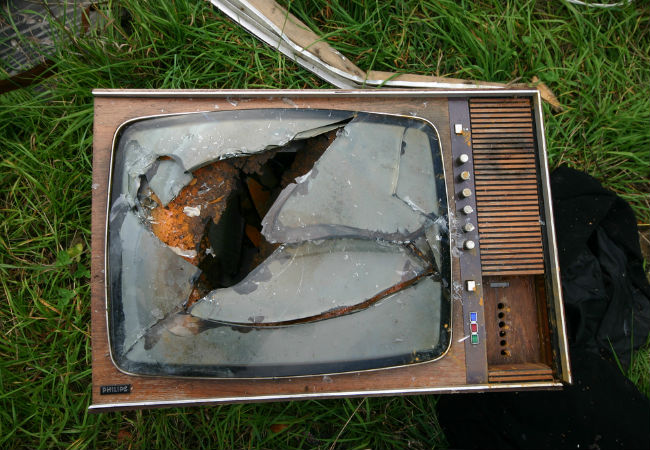
Saying goodbye to anyone and anything you love is never easy.
Even if you accept the inevitability of their impending absence, a part of you still screams that it’s not fair (the inner five year old lives!) and you want to beg and plead with anyone who will listen to keep the person you love, the program you adore being a part of, or the TV show you can’t go a week without watching, around for just a little while longer.
In the case of TV shows, many of which met their makers over the last week or so as the annual cancellations fiesta begat wailing, gnashing of teeth and crushing of remotes, it’s especially hard largely because while you might be able to Skype or holiday with an absent friend, no one is going to be making any more episodes of the series you love ever.
Yes, thanks to DVD boxsets and endless stray re-runs on cable TV, you can travel back in time and re-visit old friends in already-seen episodes but enjoyable though that is, there’s always a sense of melancholy to the process, an awareness that you’ll never see another new episode of the show again.
(Unless of course god forbid someone decides to throw together a reunion show, in which case run for their hills, hands over ears, saying “Lalalalala!!” at high volume, and never look back.)
So it is with that growing sense of familiar melancholy that I am going to pay tribute to three shows that I grew to love over their course of their runs on my small screens.
One more than others of course since Community, that quirky, bizarro excursion into the world of community colleges from the delightfully twisted and fantastically imaginative world of Dan Harmon, cast a long shadow over both the pop culture landscape but also my own viewing habits.
But even though Suburgatory and The Crazy Ones weren’t around as long as Harmon’s sitcome juggernaut that almost could (get #sixseasonsandamovie), and in some ways didn’t fully realise their potential, they were still damn fine, very funny shows and worthy of a remembrance of some kind.
So whip out you black-clad remotes, dim the lights and light the candles and let’s take a trip down down a soon to be memory lane (along with a nod to a show that I suspect no one will miss much, Revolution) …
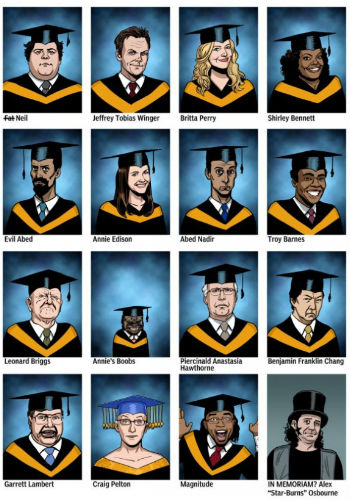
Let’s be honest – Community, which first aired on September 17, 2009, was never a cookie cutter sitcom.
Devoid of a tinny reverberating laugh track, characters whose only purpose was to set up the next so-obvious-you-could-see-it-coming-from -a-thousand-miles-away joke and a world view so small you could fit on the head of the same been-there-laughed-at-that pin, it defied expectations of what a sitcom should be at every turn.
This was both its blessing and its curse.
On the plus side, and this was considerable, wide as the Grand Canyon and populated by a thousand different parodies of pop cultures tropes, meta-humour by the ton, and characters who, while true to who they were, surprised constantly, it played with the sitcom form to its heart’s delight, bending and twisting it ’til it was almost recognisable.
Often eschewing the conventional and the everyday for the surreal and the over of the top, it was as likely to feature a paintball war that consumed the entire campus or a secret air conditioner repairmen cult as it was to have its characters fall in and out of love, friendship, or study for their next exam around the iconic library table where the group at the centre of the series always met.
You came to love soft-hearted man on the make Jeff Winger (Joel McHale), film obsessive Abed Nadir (Danny Pudi), social conscience of the nation Britta Perry (Gillian Jacobs), born again Christian sandwich maker Shirley Bennett (Yvette Nicole Brown), perky rules girl Annie Edison (Alison Brie), reformed jock and Abed’s BFF Troy Barnes (Donald Glover) and irascible old rich man and eternal student Pierce Hawthorne (Chevy Chase) as if they were your own thoroughly dysfunctional family.
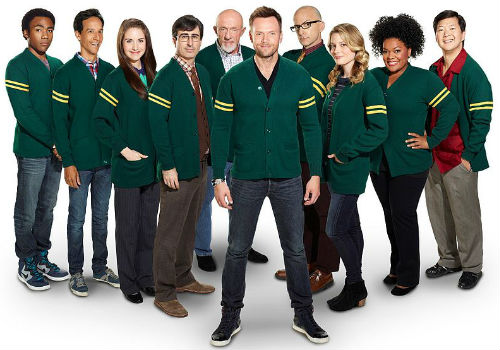
Throw in a treasure trove of eccentric extras like Dean Pelton (Jim Rash), whose relentlessly upbeat demeanour and fabulously extravagant dress sense, not to mention unrequited love for Jeff made him a must watch in every scene he was in, Ben Chang (Ken Jeong) who gave us an endless iterations on the theme of “crazy” and recurring nut jobs like Magnitude ( Luke Youngblood), Garrett Lambert (Erik Charles Nelson) and “Star Burns” (Dino Stamatopoulos) and you had the sort of assortment of comedically rich characters that wouldn’t have been out of place at most peoples’ extended Christmas family gatherings.
They were sweet, funny, generous, bat-shit crazy at times, just as prone to go to war with each other as to affirm and support but they were never less than memorable and imaginative, as at home studying as embarking on animated adventures into their own deeply troubled but endlessly colourful subconsciouses.
Alas all of this considerable creativity (largely due to the wonderful Dan Harmon) meant that they never made it past cult status, revered by critics and a loyal cadre of fans who called long and hard for #sixseasonsandamovie, but not loved enough by the wider NBC audience to make fulfilling the iconic hashtag a reality.
And so on April 17, 2014, in an episode titled “Basic Sandwich”, we had to say goodbye to this idiosyncratic bunch of characters, although as far as I am concerned this delightfully motley bunch will spend all of eternity in one of Abed’s weird alternate universes wondering why it is they never quite manage to graduate.

Emily Kapnek is a genius.
While the rest of us suspected that beneath the manicured lawns, impeccable manners and banally inoffensive routines of suburbia lay all kinds of hypocrisy, darkness and craziness, she knew that was the case (along with a stream of indie film makers it must be said) and channelled all her disquiet about the games people play behind their The Stepford Wives facades into a very funny, if often uneven sitcom.
While it was often prone to slapstick and jokes that ran out of control resulting in a kind of discomforting insanity, her tale of single dad George Altman (Jeremy Sisto) and plucky wise-beyond-her-years daughter Tessa (Jane Levy) who move from the anonymous and acceptable unorthodoxy of New York City to the stultifying conformity of Chatswin , was gleefully adept at skewering all manner of social conventions with a satirical barb here, a wilfully unaware character there.
Through the lens of Kapnek and her team of talented writers who turned formerly benign staples of suburban life such as talent quests, fun runs and parent/teacher nights into the stuff of hilarious class warfare, the veil was lifted on life out in the ‘burbs.
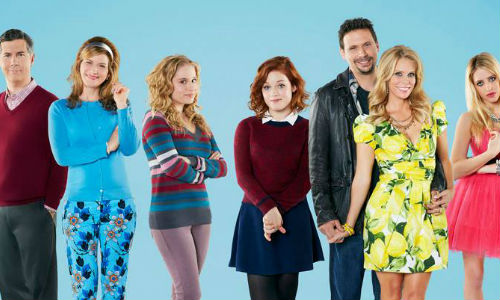
Careful not to make staples of the suburban scene such as George’s on again/off again lover Dallas Royce (Cheryl Hines) and her daughter (and Tessa’s overly well-dressed nemesis) Dalia (Carly Chaikin) and a host of others, laughing stocks, too unsympathetic to be watchable, Kapnek didn’t so much make fun of them as simply let them make fun of themselves just being exactly who they were.
Yes, there was the implicit idea that the things the people of Chatswin valued were supremely odd (sometimes freakishly so) if you scratched just below the surface, but like all good satire, the accent was on sending up the social conventions, not the people unwittingly trapped by them who were, after all, simply living what they thought were worthwhile lives.
While it took a nose dive in season 2, forgoing the withering social satire for comedic slapstick a little too often, it found its sitcom mojo in season 3 and was just beginning to show what it could accomplish if you gave it the time to.
ABC it seems was not of the mind to be that generous, and while there is a chance that we will George, Tessa and the socially straight-jacketed citizens of Chatswin once again since it is being shopped to other networks, there are no guarantees in TV land, and it’s highly likely that this quirky show will have shuffled off its mortal coil to that great sprawling mall in the sky.
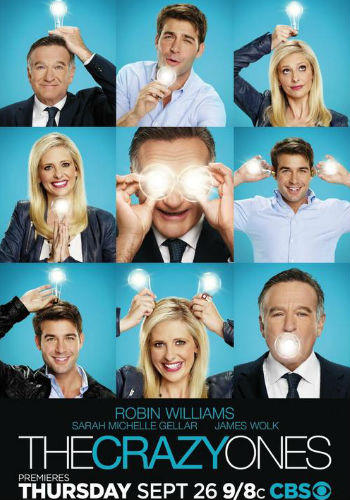
When The Crazy Ones was first announced to a breathless TV viewing world during last year’s fall season previews, many people almost immediately presumed, and with very little evidence to support it I might add, that it was a vanity vehicle for Robin Williams and nothing more, a sitcom slave in waiting to his runaway comedic impulses.
While I am one of those people who happen to like it when Robin Williams gets well and truly carried away, exhausting though it can be keeping up with his rapid fire, highly intelligent wit, what The Crazy Ones gave us, thanks to the steadying hand of David E. Kelley (Boston Legal, Ally McBeal), was one of the funniest ensemble comedies in quite some time.
Unafraid to indulge in off-the-wall looniness when a plot demanded it, and making exuberant use of Williams’ impressive comic abilities – c’mon, you’d be a fool not to and Kelley knew it – The Crazy Ones was also cognisant of the fact that the truly memorable sitcoms are the hard work of a village full of people.
Taking this Hilary Clinton-esque philosophy to its logical sitcom extremes, the show made good use of each and every cast member, giving them fully-rounded personalities, whims and lives, accommodating them all in every plot in a way that never seemed forced or gratuitous.
It also remembered that all the truly great sitcoms had thriving relationships at their heart, intimate connections that had more than a ring of emotional authenticity about them, that existed in and of themselves, and not simply as a means of generating quick and easy laughs.
That they generated these laughs often and to great effect was undeniable, but what was truly impressive was that attention was paid not simply to the big marquis connections such as that between Robin Williams’ character larger-than-life legendary Chicago ad man Simon Roberts and his emotionally ill-at-ease ad agency executive daughter Sydney (Sarah Michelle Gellar), or between Roberts and star pupil and surrogate son Zach Cropper (James Wolk) to name two but to the smaller, less obvious relationships.
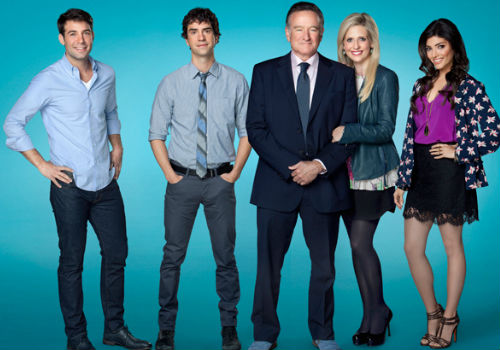
These included the tetchy though enduring friendship between Roberts and his long time gay business partner, towering accountant Gordon Lewis (Brad Garrett), or the friendship between Cropper and colleagues Andrew Keanelly (Hamish Linklater) and Lauren Slotsky (Amanda Setton).
Judicious use was also made of the revolving cast of clients, some of long standing, some brand spanking new but all of them eager to get the most bang for their advertising dollar buck and all defined in one way or another by their self-obsessions, eccentricities and quirks.
(It was these relationships that formed a large part of the 5 things I love about The Crazy Ones.)
Thus, what truly defined The Crazy Ones was that while it could become insanely, surrealistic wacky at times, it always retained a key sense of the characters powering its comedy, giving a strong grounded feel to its often quirky plots.
And the sad part of its cancellation is that it was only just really beginning to find itself, with the promise of a whole world of hilarious workplace comedy waiting in the hoped-for second season.
All we can hope is that Simon Roberts will leap out of his own sitcom, shatter the fourth wall and dream up the ad campaign to end all ad campaigns and convince CBS to give it another shot.
That could totally happen right?
In the universe of The Crazy Ones it totally could but alas we are stuck in the real world and it sadly no longer has time for this sitcom’s restrained insanity.
And last but alas very least by the end of its second season … REVOLUTION
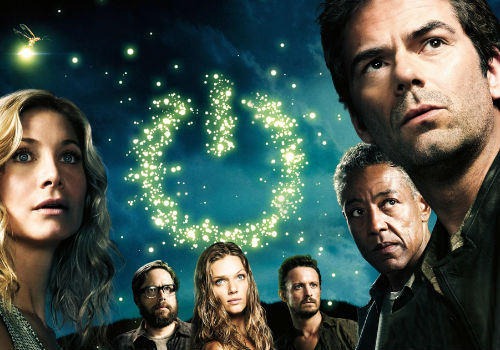
Revolution was a show I kind of liked at first (more its premise than its execution to be honest).
Then after 3-4 episodes, didn’t like and decided to never watch again.
But following entreaties from my housemate that it had vastly improved from the rather empty first few episodes, I sampled it again, got hooked and watched right to the end of season 1, transfixed and utterly absorbed by its post-apocalyptic vision of world robbed of any and all forms of electrical energy.
And then came season 2, wildly uneven, in search of a reason to be season 2, 22 episodes that didn’t quite know what to do with themselves once the Big Mystery of season 1 had been explained.
Still, I hung in, convinced that any moment now all the disparate middling storylines would pay off, that the writers would realise that they should be focusing on the nanites and Zak Orth (Aaron Pittman) with its promise of a richly dramatic dark conspiracy rather than on the endless, and often pointless battles fought by Miles Matheson (Billy Burke), Rachel Matheson (Elizabeth Mitchell) and daughter Charlie (Tracy Spiridakos) and an ever changing cast of allies against the evil re-formed United States.
And even when Major Tom Neville (Giancarlo Esposito) kept sneering and posturing with all the delicious flair of a Vaudevillian baddy, or “Bass” Monroe (David Lyons) couldn’t resist entertaining ever more out of reach of grandeur about regaining his lost republic, I hung in there convinced a compelling narrative would emerge.
That a functioning, well told vision of a broken future would come into being, sustaining a wealth of narratives about people doing their best to survive in a Darwinian environment.
Alas, Revolution, a show I so passionately came to embrace after a lacklustre first date or two, became a premise in search of a decent plot, its rambling inability to find itself reflected in declining viewer numbers such that NBC went ahead and recently cancelled it.
And you know what?
I am not that troubled at all, a sign that the show had really lost its way, lights or no lights, and had very little hope of finding its way back.
This is one show whose time had well and truly come.